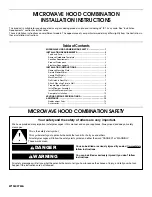
8
Installation for Wall Stud at One End Hole (Figure 3)
1. Drill a 3/16" (5 mm) hole into the wall stud at the end hole
marked in Step 3 of “Mark Rear Wall.”
2. If installing on a second wall stud, drill a 3/16" (5 mm) hole into
the wall stud at the other hole marked in Step 6 of “Mark Rear
Wall.” Refer to Figure 3 in “Possible Wall Stud Configurations”
in “Locate Wall Stud(s)” section.
3. Drill a 3/4" (19 mm) hole through the wall at the other end hole.
Installation for Wall Studs at Both End Holes (Figure 4)
1. Drill 3/16" (5 mm) holes into the studs at the end holes marked
in Step 3 of “Mark Rear Wall.”
Attach Mounting Plate to Wall
NOTE: Secure the mounting plate to the wall at both end holes
drilled into the wall studs and/or drywall using either 1/4-20 x 3"
round-head bolts and toggle nuts or 1/4 x 2" lag screws.
Refer to illustrations in “Possible Wall Stud Configurations” in
“Locate Wall Stud(s)” section.
No Wall Studs at End Holes (Figures 1 and 2)
NOTE: The mounting plate must be secured to the wall on at least
1 wall stud as well as at both ends.
1. With the support tabs of the mounting plate facing forward,
insert 1/4-20 x 3" round-head bolts through both end holes of
mounting plate.
2. Start toggle nuts on bolts from the back of the mounting plate.
Leave enough space for the toggle nuts to go through the wall
and to open.
3. Position mounting plate on the wall.
4. Push the 2 bolts with toggle nuts through the drywall, and
finger tighten the bolts to make sure toggle nuts have opened
against drywall.
5. Insert lag screw(s) into the hole(s) drilled into wall stud(s) in
Step 2 of “Installation for No Wall Studs at End Holes” in the
“Drill Holes in Rear Wall” section.
6. Check alignment of mounting plate, making sure it is level.
7. Securely tighten all lag screws and bolts.
Wall Stud at One End Hole (Figure 3)
1. With the support tabs of the mounting plate facing forward,
insert a 1/4-20 x 3" round-head bolt through the end hole that
fits over the 3/4" (19 mm) hole drilled in Step 3 of “Installation
for Wall Stud at One End Hole” in the “Drill Holes in Rear Wall”
section.
2. Start a toggle nut on the bolt from the back of the mounting
plate. Leave enough space for the toggle nut to go through
the wall and to open.
3. Position mounting plate on the wall.
4. Push the bolt with toggle nut through the drywall, and finger
tighten the bolt to make sure toggle nut has opened against
drywall.
5. Insert a lag screw into the remaining end hole.
6. If installing on a second wall stud, insert a lag screw into the
other hole drilled in Step 2 of “Installation for Wall Stud at One
End Hole” in the “Drill Holes in Rear Wall” section.
7. Check alignment of mounting plate, making sure it is level.
8. Securely tighten the lag screw(s) and bolt.
Wall Studs at Both End Holes (Figure 4)
1. Position mounting plate on the wall.
2. Insert lag screws into both end holes.
3. Check alignment of mounting plate, making sure it is level.
4. Securely tighten the lag screws.
Prepare Upper Cabinet
1. Disconnect power to outlet.
2. Remove all contents from upper cabinet.
3. Place Upper Cabinet Template against the bottom of the
upper cabinet, and attach with tape or thumbtacks. Make sure
the template centerline aligns with the vertical centerline on
the rear wall.
The “rear wall” arrows must be against the rear wall so that the
holes cut into the upper cabinet align with the holes in the top
of the microwave oven.
NOTES:
■
If the upper cabinet has a frame around it, trim the template
edges so that it fits inside the frame, against the upper cabinet
bottom. The template has trim lines to use as guides.
■
If the wall behind the microwave oven (as installed) has a
partial wall covering (for example, tile backsplash), be sure the
“Rear Wall” arrows align to the thickest part of the rear wall
(for example, the thickness of the tiles rather than the drywall).
4. Make sure the 10" (25.4 cm) dimension from the rear wall to
points “D” and “E” on the template is maintained.
A. 1/4-20 x 3" round-head bolt
B. Mounting plate
C. Spring toggle nut
A. 1/4-20 x 3" round-head bolt
B. Mounting plate
C. Spring toggle nut
D. Drywall
C
A
B
A
B
C
D
D
E
G
Uppe
r-cabinet temp
l
at
e
F
10"
(25.4 cm)
10"
(25.4 cm)






























